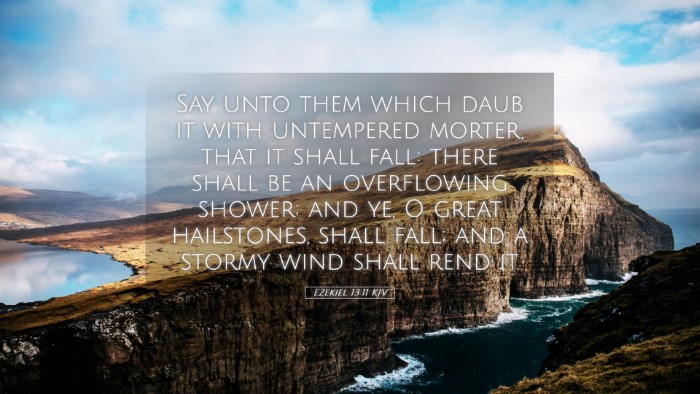Commentary on Ezekiel 13:11
Verse: Ezekiel 13:11 - "Say unto them which daub it with untempered morter, that it shall fall: there shall be an overflowing shower; and ye, O great hailstones, shall fall; and a stormy wind shall rend it."
Introduction
The prophetic utterance of Ezekiel in this verse addresses the failure of false prophets and their misleading teachings. The imagery used by Ezekiel effectively conveys the imminent destruction that will come upon both the deceptive builders and their faulty constructions. This commentary draws insights from esteemed public domain commentaries by Matthew Henry, Albert Barnes, and Adam Clarke to provide a comprehensive understanding of this verse.
Textual Analysis
Ezekiel 13:11 employs vivid metaphors relating to architecture and natural calamities, thus illustrating the consequences of spiritual deception. In the phrase "daub it with untempered morter," Ezekiel critiques the superficiality of the prophets' message, which lacks divine substance.
Meaning of 'Untempered Morter'
Matthew Henry notes that 'untempered morter' applies to those who fabricate a semblance of protection and truth without the necessary strength and stability provided by sound doctrine. Such a foundation is ultimately doomed to fail under pressure.
- Spiritual Implication: The use of weak materials symbolizes the fragility of the false prophets' messages, which cannot withstand spiritual scrutiny or the impending judgment of God.
Consequence of False Prophecy
Albert Barnes emphasizes that the metaphorical collapse is not just a physical demise but a spiritual and communal one. The 'stormy wind' and 'great hailstones' are indicative of divine judgment that will sweep through and destroy what has been falsely constructed.
- Judgment and Accountability: The verse illustrates that misleading teachings and prophecies will bring about accountability before God. The fallout from weakened structures affects not only the builders but also those who placed their trust in them.
The Role of the Prophet
Adam Clarke elucidates that the task of the prophet is to declare the truth irrespective of societal acceptance. The warning issued by Ezekiel serves as a crucial call to genuine accountability among leaders within the spiritual community.
- Authenticity in Prophecy: Authentic prophecy requires firmness in doctrine and convictions rooted in the Word of God. If left unchecked, false prophecies can lead to spiritual devastation.
Theological Themes
This verse encapsulates several key theological themes fundamental to understanding the prophetic literature:
- Divine Judgment: The certainty of God's judgment is a recurrent theme. The overwhelming 'shower' and destructive elements signify that God's displeasure leads to inevitable consequences for those in error.
- False Prophecy vs. True Revelation: A contrast is drawn between the truths revealed by God through His prophets and the deceptive narratives presented by those who lack divine inspiration.
Practical Application
For contemporary pastors and theologians, Ezekiel 13:11 serves as a powerful reminder of the responsibility associated with spiritual leadership.
- Discernment: It is paramount to exercise discernment in teachings, ensuring they align with the foundational truths of scripture.
- Integrity in Ministry: Leaders must be diligent in their calling, avoiding the temptation to deliver soothing messages that please men at the cost of spiritual truth.
Conclusion
In sum, Ezekiel 13:11 profoundly speaks to the consequences of spiritual negligence and the importance of adhering to the authenticity of God's Word. The unified perspectives from Matthew Henry, Albert Barnes, and Adam Clarke collectively affirm that the integrity of prophetic truth remains vital for theological fidelity and communal spiritual health.


